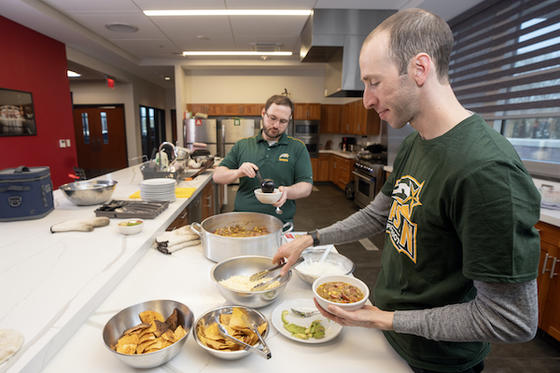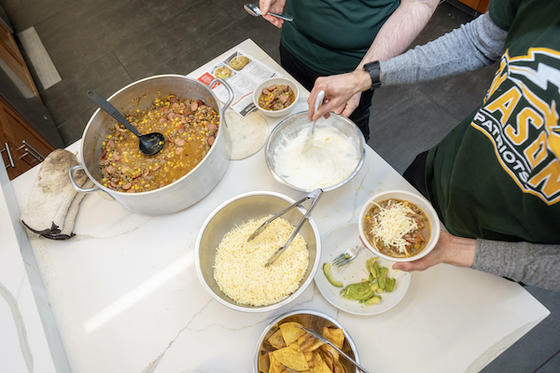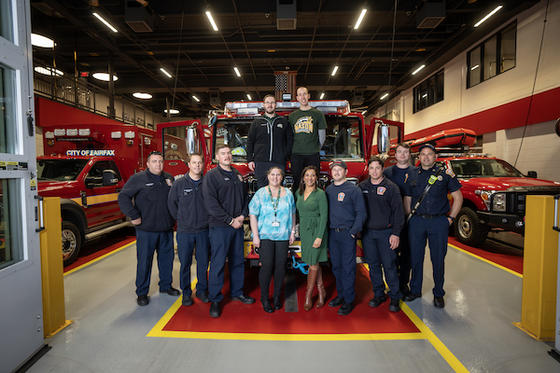Students from George Mason University’s Department of Nutrition and Food Studies recently visited the men and women of Fairfax Fire Station 33. They taught the firefighters about responsible nutrition habits and cooked nutritious meals for them in the station’s kitchen.

The experience was part of the master of science in nutrition degree program with a dietetics concentration in the College of Public Health. The program is a pathway to becoming a registered dietitian nutritionist. The seven graduate students in the MS/RD program will be the first to graduate from this program in May.
“The meal preparation is 100 percent student led, and it has to be a completely original and healthy recipes suitable for the firefighters’ needs,” said Sapna Batheja, program director and an assistant professor of nutrition.
The students were split into three groups and prepped meals during three different shifts at the firehouse following the department’s ABC shift pattern, which covers a three-day cycle.
Master of nutrition students Marcus Brick and Mark Rudich worked on this project together, and their dish was a Green Chili Turkey Chili. Rudich had previously made the dish for his family and wanted to recreate it for the firefighters.
“The parameters of the project focused on firefighter performance,” said Brick. “A big part of the meal was making sure that the firefighters had an adequate amount protein—about half a pound of meat [per person]—for a good amount of energy so they're fueled and ready to go for whatever emergency may come.”

In their research, the students found that cardiovascular disease is one of the largest issues facing the American population, especially firefighters, said Brick. “But you can reduce that risk by eating plenty of fresh fruits and vegetables, and supplementing them in any meal that you have,” Brick added.
College of Public Health faculty members Batheja, Lilian Dejonge, Allison McKay, and Allison Miner and registered firefighter dietitian Megan Lautz also attended the dinners.
Lautz has been a registered dietitian since 2015 and has a unique position as many fire departments don’t have an in-house dietitian. She works with dietitian students across the Washington, D.C., metropolitan area, including Brick, Rudich, and the rest of their cohort.
Lautz met with the students regularly and provided them with Excel templates to guide them throughout the process, said Brick. “They were really handy to have and made our workload a lot easier to handle.”
“They not only had to research and develop recipes in a professional format, but they also cooked meals for six to nine people, including the fire chief,” said Lautz.

After the meal was prepared, the students gave presentations to the firefighters about the importance of a healthy diet. Brick and Rudich’s presentation featured the myths and cons of green powder diet supplement.
“Public speaking is a big part of being a dietitian, and throughout the course of this program, we’ve had a lot of opportunities to practice educating others on nutrition,” said Brick. “I've tried to stick with topics that I don't know much about to fill in my knowledge gaps as I teach others.”
“Without Megan and this program, I wouldn't have known that firefighter dietitian was a niche that I could go into. I can work with airline pilots, doctors, and so many other patient populations, and the program really helped me prepare for that,” said Brick.
In This Story
Related Stories
- April 10, 2024
- July 7, 2023
- June 22, 2023
- February 28, 2023
- August 31, 2022
